Fifa’s global football plans set up clash with Uefa
Proposals for two new tournaments threaten primacy of Europe’s Champions League
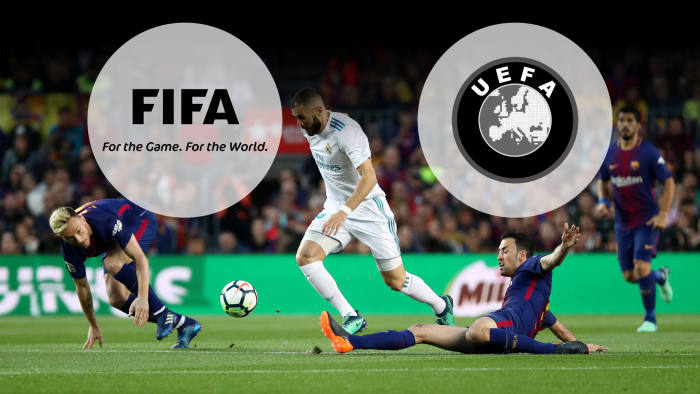 © FT montage / Reuters
© FT montage / Reuters
Murad Ahmed and Arash Massoudi in London May 18, 2018
When Gianni Infantino was elected president of international football’s governing body Fifa, the European game’s leaders celebrated as one of their own took charge of the sport worldwide. A long-time executive at European governing body Uefa, the Swiss-Italian was seen as a welcome transfer to Fifa, which he promised to reform after a corruption scandal that threatened its future.
But since taking office two years ago he has proved his own man, launching an audacious challenge to his past European paymasters that puts Fifa and Uefa on track for a critical showdown.
Mr Infantino is leading a radical plan to create two global tournaments, engaging in secret talks with a consortium of international investors including Japan’s SoftBank that has promised $25bn for the project.
Fifa's new football club world cup explained
[video]
https://next-media-api.ft.com/rendition ... 0x1080.mp4[/video]
The proposal envisages the expansion of the Club World Cup, an annual competition contested by seven top teams from across the globe, into a 24-strong tournament held every four years, as well as a new league contest for national teams.
In a letter to Fifa’s ruling council last month, Mr Infantino hailed the plan’s “obvious sporting benefits for football worldwide”, saying it would provide “sustainable and guaranteed growth of our game by attracting the — by far — highest investment football has ever seen.”
Yet the concept has faced vocal opposition from Uefa, the financial powerhouse of the game. The European body’s tournaments, including the Champions League, considered the pinnacle of the club game, draw about €2.5bn in broadcasting and sponsorship revenues every year.
Regular Champions League appearances have entrenched the likes of Manchester United, Real Madrid and FC Barcelona as the world’s wealthiest clubs, helping them retain international fan bases.
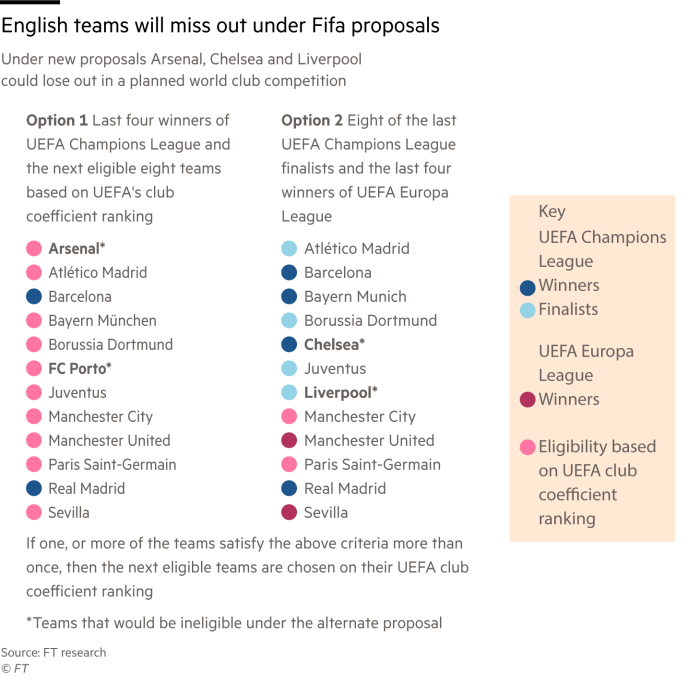
After a meeting with member clubs, national associations and players, Uefa on Wednesday offered a scathing assessment of Fifa’s plans, criticising “the hasty timing and lack of concrete information”.
Mr Infantino is eager for the issue to be resolved by June 13, when Fifa’s members will vote on the hosts of the 2026 World Cup, according to people close to the Fifa president.
The organisation is financially reliant on staging the World Cup — the latest edition of which takes place in Russia next month — with television and commercial rights for the event representing 90 per cent of its revenues.
Creating new global competitions could allow Fifa to diversify its revenue streams, which its leaders believe will help fulfil its mission to expand the sport around the world. It insists all the money from the new competitions will be returned to confederations, national bodies and clubs.
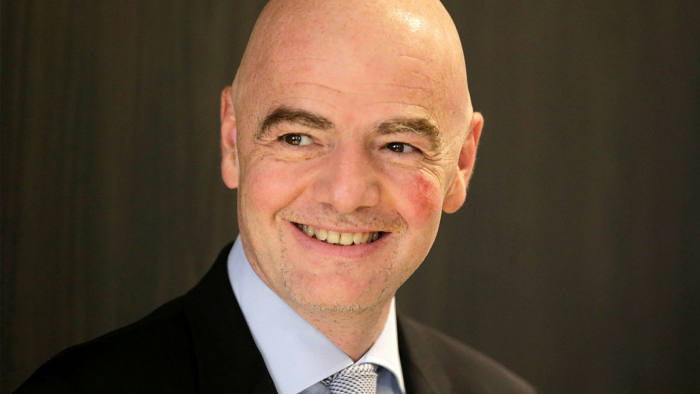 Gianni Infantino declined to reveal the identify of members of the consortium when he first presented the offer last March © Reuters
Gianni Infantino declined to reveal the identify of members of the consortium when he first presented the offer last March © Reuters
Yet some football administrators and executives said Mr Infantino may also be motivated by a desire to secure a multibillion-dollar windfall for Fifa members, made up of more than 200 national associations, in the hope of securing his re-election as president next year. One of his key election pledges in 2016 was to quadruple “development” funding to member associations during his tenure.
Fifa said the tournament proposals had no connection to its leadership election.
A senior executive close to Uefa’s leadership said there was growing anger at the lack of deliberation over Fifa’s proposals, saying key questions — such as why the consortium should own 49 per cent of the joint venture that would be created to commercialise the competitions — had not been answered.
“Football, by and large, needs consensus and needs people to be happy with it,” said another person close to Uefa’s leaders. “To do things against certain big stakeholders . . . is a dangerous road.”
When Mr Infantino first presented the consortium’s offer during a meeting of its ruling council in Bogotá in March, he declined to reveal the identity of its members, citing non-disclosure agreements, according to people with knowledge of the meeting. Despite this, he insisted the deal be completed within 60 days. The council refused to go along with the plan, demanding more information on which to base its decision.
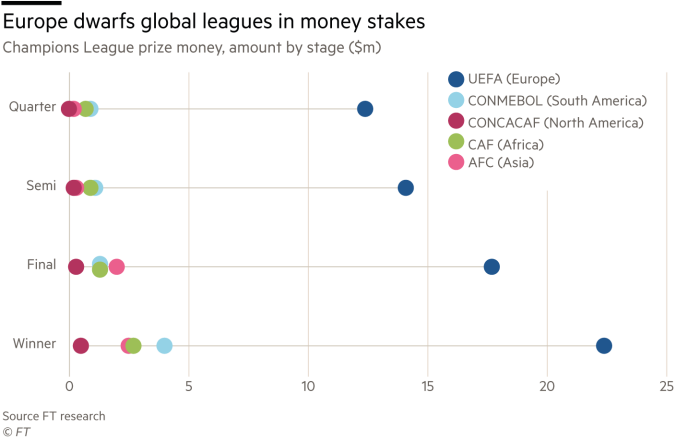
Fifa has since then worked with the consortium on fleshing out the proposals, and is set to call a vote of its ruling council during an emergency meeting in the coming weeks. People close to organisation said Mr Infantino would reveal the investors’ identities at the meeting, but had so far only told council members that they represented “major interests and multinationals in Asia, Europe and North America”.
The consortium is being assembled by Centricus, a UK-based group whose founders helped SoftBank raise its $100bn Vision Fund, people close to the matter previously told the FT.
Although Fifa is confident confederations and national associations will back the idea, securing Uefa’s support could prove pivotal.
According to a presentation for the expanded Club World Cup, Fifa plans to include at least 12 European sides in its new global club tournament, despite European nations making up only a quarter of member associations. The proposed structure is a recognition that global broadcasters and corporate groups will want to screen matches featuring European heavyweights.
There has been alarm at the potential of adding yet more football to the schedule of in-demand footballers. The World Leagues Forum, a group representing national league competitions around the world that is led by English Premier League executive chairman Richard Scudamore, said last week it would “vigorously oppose” any plans to “impact negatively upon the already congested match calendar”.
Fifa believes it can allay such concerns, insisting the new tournaments will actually reduce the amount of matches played each year. The Club World Cup would take place in June during the time allocated for the four-yearly Confederations Cup, which would be abolished. Nations League matches would take place on dates allocated for national “friendly” matches, which they would replace.
One executive close to Fifa’s leadership said the changes could even reduce the strain on top players, estimating that Real Madrid star Cristiano Ronaldo would have played eight matches less in a four-year cycle.
Fifa believes it can win over clubs, promising $1.9bn in prize money in each Club World Cup tournament and a further $600m in “solidarity” payments — financial support to football confederations, national organisations and smaller clubs.
Last week it held talks with a handful of European superclubs that are considered likely participants. Following the meeting, Spain’s FC Barcelona said the tournament would be “an exciting, dynamic, inclusive and prestigious competition . . . Fifa’s proposal will create a global platform for club teams, which will contribute to the growth of brands, increasing fans’ engagement and providing a new source of income to reinvest in the game.”
Real Madrid and Italy’s Juventus also signalled their support this week.
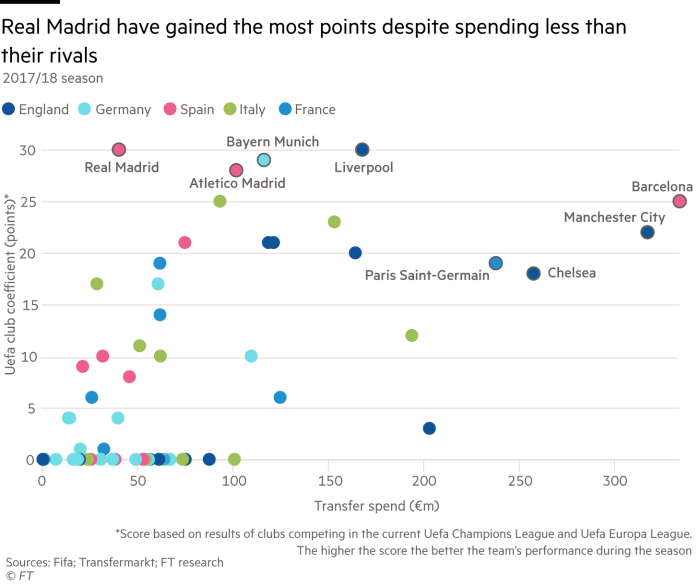
But the fact the meeting was held with only a select group of top clubs angered some at Uefa, who worry Fifa’s plans will further entrench the disparities between Europe’s super rich and its weaker clubs.
Concerns also remain that the European game is being asked to give its blessing to a seismic change in the sport without full knowledge of what it is being asked to sign up to.
“You can always smoke the clubs out with cash,” said a senior executive at one of the continent’s leading teams. “But there will need to be concessions. When will we get the time to play the games? How will the teams be picked? We just don’t know.”
Uefa cries foul over Nations League
Fifa’s proposal of expanding the Club World Cup has grabbed the headlines. But it is the alleged power grab over a second competition — a global “Nations League” — that shows how it is increasingly at odds with Uefa.
Uefa last year launched its own Nations League contest for European countries, intending to replace some “friendlies” with competitive games. These matches would be played outside the period when nations play qualification games for tournaments such as the World Cup or European Championships.
Fifa’s proposals build on the concept. Each of its federations, from South America to Africa, will be instructed to create their own Nations League. The winners of these continental competitions will play in a global “final eight” tournament every four years.
The consortium has promised $13bn in revenues for four editions of the Nations League, up until 2033. But according to a letter seen by the Financial Times, Fifa will require Uefa to “transfer the commercialisation” of Nations League games in return for about $560m every four years.
Uefa is angered by the prospect of handing over financial control of a concept it invented.
“We had an idea about a possible Global Nations League,” Uefa president Aleksander Čeferin said In a recent interview with German magazine Kicker. “We first presented it to the Fifa president, then to national associations and to clubs. And all of a sudden Fifa comes and says they are ready to sell it, our idea, to a fund without any explanations. It is really a strange offer.”
https://www.ft.com/content/71bbe454-59d ... ceb45fa9d0 





